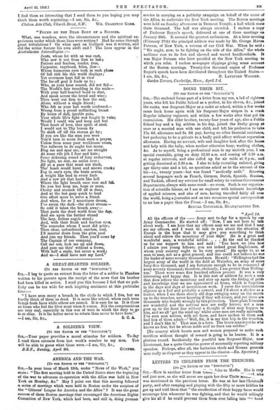DOING THEIR BIT.... •
[TO THE EDITOR OP THE " SPEOTATOIL'i SIR, —The enclosed forms part of a letter from my son, a lad of eighteen years, who left his Public School as a prefect, in his eleven, &c., joined the ranks, was Sergeant-Major as a cadet at school, within a few weeks came back home again with his Sergeant-Major stripes in a crack Regular infantry regiment, and within a few weeks after that got his commission. His elder brother, twenty-four years of ago, also a Publie School boy and a big athlete in his day, joined the Derby group at once as a married man with one child, and left his profession to take 17s. 6d. allowance and Ss. 6d. pay, having no other financial assistance, but preferring to be a private to a badly paid officer without separation allowance. Having no servant, wife and daughter look after the house and help with the baby, when mother otherwise busy, washing clothes, &c. As to myself, being a professional man in my sixtieth year. I am special constable, going on duty 12.30 a.m. and coming off 5.30 Lin. at regular intervals, and also called up for air raids at 9 p.m., and getting dismissed at 3.30 a.m. I also to help recruiting enlisted, giving age thirty-nine and a bit, no questions asked as to the amount of the bit—i.e., twenty. years—but was found "medically unfit." Knowing several languages such as French, German, Dutch, Spanish, Russian, and Turkish, offered my services for small salary to various Government Departments, always with same result—no room. Such is our organiza- tion of scientific labour, as I am an engineer with intimate knowledge of applied sciences, and also of men, having travelled fairly all over the world, being a journalist and on two occasions special correspondent to no less a paper then the Times.—! am, Sir, &c., SPECIAL CONSTABLE, HEADQUARTERS Div.
All the officers of the — Army met to-day for a speech by oar Army Commander. He started off : Now, I am not here to talk about work. I am here that my officers may see me and that I may see my officers, and I want to talk to you about the situation of Europe in the hope that it may give you something to think about and relieve the monotony of your days.' He is a great and wonderful man, a wonderful soldier. . . . At the end he thanked us for our support to him and said : Yon have no idea how I admire you young fellows; you are indeed great Englishmen, of whom your country ought to be very proud.' He spoke to U3 EU man to man, not as a great general, and one could not-believe he was the leader of some seventy thousand men. He said: Wellington had the largest army of the world in the field at Waterloo, an army of some forty-five thousand, and I am fortunate enough to ho in command of some seventy thousand; therefore, obviously, I am greater than Welling- ton.' There were some five hundred officers present. It was a very interesting and happy day. It is this sort of address by such a man that does relieve the monotony and stirs up again the feeling of pride and knowledge that we are appreciated at home, which is forgotten in tho days and days of monotonous work. I curse the conscientious objector as a fool and probably a coward, and I'd shoot a slacker as a traitor, when I see these cheery old dogs swinging away on the march up to the trenches, never knowing if they will return, and yet there am thousands who benefit wrongly by this protection. These plain Tommie. are wonderful and the nervous men are really heroes; not a man goes up to the front line without a thought of what may happen to him, and we all get the wind up,' whilst some men are really miserable. I've seen men serious, with sot faces, and have spoken to them and find lots of them admit—' Well, Sir, it is my first trip in the trenches, and I don't like it.' That man is a hero. The brave man is not he whe knows no fear, but he whose noble soul no fears can subdue."
[No country which boasts men and women prepared to make suck
sacrifices without thought of reward is going to be beaten. It Is • glorious record. Incidentally the youthful late Sergeant-Major. now Lieutenant, has a quite Caesarian power of summarily reporting military speeches. Perhaps, after all, the barbarian chiefs and Roman generals were really as eloquent as they appear in the classios.—E. Spectator.]


























 Previous page
Previous page